|
 |
What We Owe Our Country
We need to get past the relentless focus on self-criticism and back to the real American story
When I was growing up, my mother once told me that, as a parent, her job was to love me unconditionally. That didn’t mean, she said, that she would be uncritical or wouldn’t hold me accountable for my transgressions. But it did mean that she would always be on my side.
I think about this conversation whenever I consider what we owe our country. We don’t owe the United States our blind or uncritical allegiance, but we should give it our unconditional support and, yes, our love as well. After all, we’re family.
Of course, lately, the family dynamic has been strained, to say the least. Americans are bitterly divided along political, class and other lines. The country is also suffering from a trust crisis the likes of which it hasn’t experienced in almost a century. Nearly all our core public and private institutions, including government, business, education, the media, religion and the professions, are increasingly seen as incompetent, self-dealing and even corrupt. All these strains have been amplified by the fallout from a series of recent black swans ranging from 9/11 to the 2008 financial crisis to the pandemic.
These and other problems are reflected in what we’ve been telling pollsters. As recently as 2004, for instance, 91% of our fellow citizens said they were proud or extremely proud to be American; by last year, that share had dropped to just 58%. Even more disturbing, in a recent Quinnipiac poll nearly 4 in 10 Americans (including 48% of young adults) said they wouldn’t fight to defend the United States if it were invaded. Think about that one for a minute: We’re not talking about sending Americans to war in a far-off jungle or desert but asking them to fight to defend their homes and communities from foreign invasion.
In addition to the recent polarization and the trust crises, America is also enduring what I would call a crisis of confidence. This is sadly ironic, given that the founding and development of the United States has been the most successful political and social experiment in human history bar none. It has offered hundreds of millions of people from different parts of the globe the kind of freedom and opportunity that most of the rest of humanity can only dream about—which is why so many others have tried to come here, and still do. This success story is true even for the descendants of those who were cruelly brought here in chains and those who experienced intense prejudice when they arrived.
But this story has been shamefully hijacked by those who do not appear to love America or wish it well. From Howard Zinn’s “A People’s History of the United States” to Nikole Hannah-Jones’ “The 1619 Project,” new histories unfairly hold up the United States as an exemplar of racism and oppression, all the while ignoring the fact that America is and has long been an unprecedented haven for people from all over the world seeking freedom from intolerance, persecution and lack of social mobility. This self-destructive view has infected many parts of our society, including our messaging and educational institutions. Is it any wonder, then, that after being told America’s history is a trail of tears, a plurality of young adults doesn’t want to fight to defend their country?
The road back from this ridiculous orgy of self-flagellation does not run through the White House or Congress or even our classrooms, as important as these places are. That’s because our salvation ultimately lies in our natural desire to belong to and believe in something bigger than ourselves. And the good news is that you don’t have to squint to love America and to want to be an integral part of the American story. Warts and all, our country is still a miracle, a 250-year-old experiment in freedom and tolerance. It’s also a nearly 350-million-person petri dish where people originally from India and Italy, Britain and Bolivia, Germany and Ghana all work, play and dream together, intermarry and have children together, and continue to build and grow the most dynamic, creative and innovative country on earth.
So be proud of America, love it unconditionally and then pass these feelings on. That’s what you owe your country.
You’re currently a free subscriber to Discourse .
